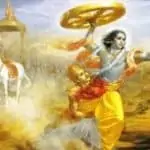
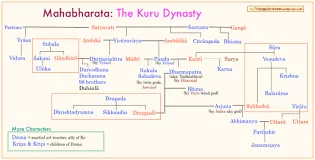
Mahabharata
The Mahabharata is an epic that comprises one hundred thousand stanzas of verse divided into eighteen books, or parvas. It is the largest single literary work in existence.
Originally composed in the ancient language of Sanskrit sometime between 400 BC and 400 AD, it is set in a legendary era thought to correspond to the period of Indian culture and history in approximately the tenth century BC. The original “author” was Vyasa who tried to tell about the Great War between the Pandavas and the Kauravas – cousins who claimed to be the rightful rulers of a kingdom.
The background to get to where the epic starts is very confusing (in medias res). I’ll present the background a bit here just to lay the groundwork.
King Santanu married a strange woman he found by the river. They had many children and she drowned all of her children. The king stopped her from drowning the last child (a boy). She then said she was a goddess and that this child was a god but had to remain on earth as punishment for stealing a sacred cow in a past life. The child was named Devavratha, but to confuse you he is called Bhishma (one of firm vow).
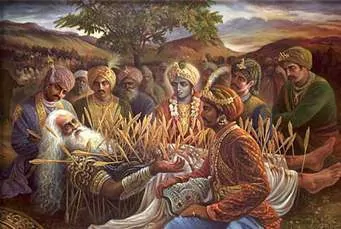
The goddess went back to wherever it is that goddesses go, and the king continued ruling.
One day he fell in love with a woman who ran a ferry; her name was Satyavathi. King Santanu asked her father if he could marry her, and he said yes, but only if Satyavathi’s children inherit, leaving poor Bhishma out in the cold. Bhishma was actually cool with this and said he would remain celibate so that he never had children. Thus, King Santanu and ferry woman Satyavathi married. They had two boys: one had no children and died in battle, and one (Vichitravirya) grew to adulthood and married two women (Ambika and Ambalika). But before either of his wives had children, Vichitravirya died and not long after that King Santanu also died. Thus, the only surviving member of the royal family was Bhishma who had taken a vow of celibacy and refused to break it.
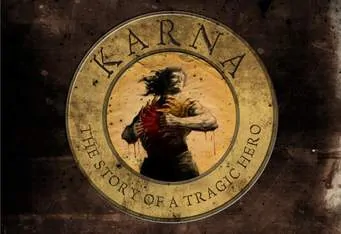
What Queen Satyavathis had not told anyone that before she was married she had actually been born from a fish and had had an encounter with a sage and given birth to a son named Vyasa. So even though Vyasa isn’t exactly the heir, but did inherit.
Thus with his yogic vision, Vichitravirya’s two wives progeny took place, they had two children. Ambika gave birth to a boy named Dhritarashtra. He was nice and should have become the king, but he was born blind. Meanwhile, Vichitravirya’s other wife gave birth to a boy named Pandu. Dhritarashtra, being blind, realizes he can’t really rule, so he gives his kingdom to his brother Pandu. Pandu loves to hunt. One day he is out hunting and he kills a deer while it is in the middle of “love play.” Turns out this is no ordinary deer but a god who curses Pandu. The curse states that Pandu, if indulged in physical closeness would die…though he had two wives but no kids at this time – Kunthi and Madri. He decides that he can’t rule, so he and his wives go away into the woods.
One day Kunthi, in her former days, calls out for the sun god. He actually appears and she is freaked out. He says, don’t call me unless you want me. He essentially ravishes her, though it’s presented in the book as somewhat consensual. She gives birth to a boy names Karna but sends him down the river in a basket. He is discovered and raised by a Drithrashtra’s Charioteer and his wife.
Pandu tells Kunthi to have relations with some other gods and have children.
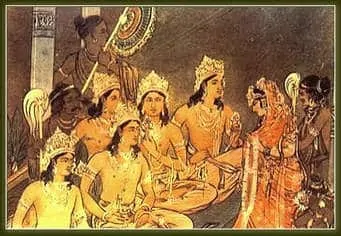
Kunthi gets with Yama (god of death and justice) and she gives birth to Yudhistira. Then she gets with Vayu (god of the wind) and has Bhimasena. Finally she does the deed with Indra (chief god) and gives birth to Arjuna. Meanwhile, Pandu’s second wife, Madri, entices the gods Aswins and has twins Nakula and Sahadeva. They are all boys, they are all awesome and they are collectively known as the Pandavas. The epic focuses on these guys.
Pandu just can’t resist his urges and tries to have sex with his wife Madri. He dies in her arms and she flings herself on his funeral pyre. Kunthi (Pandu’s other wife) takes the boys to the blind brother of Pandu, Dhritarashtra, to be raised, inherit the kingdom.
Meanwhile, Dhritarashtra (Pandu’s blind brother) married the princess Gandhari and becomes a blind king (not a desirable leader) wife. She blindfolds herself in sympathy of his blindness and never sees again. While Pandu was out in the woods with his two wives avoiding sex, Dhritarashtra became king, and he and Gandhari had 100 sons (I00 born quite delayed) that she harbors in her womb for years. she wacks her womb in frustration and vyasa creates an incubation room to get them all safely delivered.
These sons are not good boys and fight with their cousins all the time. The oldest of these children is named Duryodhana and he’s a real baddy. This collection of boys is called the Kauravas.

All 105 boys are looked after by Bhishma who is constantly trying to train them and have them get along.
The epic is an ongoing feud between the Kauravas and Pandavas.
Story
The evil brothers Duryodhana were envious of their cousins Yudhistira, Bheema, Arjuna, Nakul and Sahadev and started scheming to dethrone him. Their first attempt to kill the Pandavas was by burning them inside a palace. The Pandavas managed to escape, but then the evil brothers once again attempted to gain control.
Again they challenged the eldest brother Yudhisthira to a game of dice which led Yudhisthira to lose everything, including his and his brothers’ wife, Draupadi. He, along with his brothers and their wife Draupadi, were exiled from the kingdom. For twelve years they had to live in the forest and upon the thirteenth year they were to hide in a city in disguise. It was during those thirteen years that the brothers grew to learn what it was like to live with the bare minimum and became more knowledgeable. After the thirteenth year Duryodhana decided that he would fight against them which led to a huge war and the deaths of many. Many died from both sides and after the war, they realized that nothing was really gained.
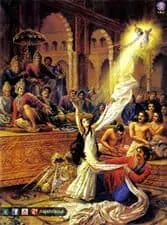
The saddest part included the disrobing of Draupadi who cursed the kauravas.
Truly the dharma of the Bharatas is lost, their own dharma is Violated.’ Said Draupadi.
Dharma, the sacred law, invested with divine authority, based on the Vedas, sacred scriptures is revealed by the Divine. In Mahabharata, the great sage Narada, tells King Yudhisthira, that dharma is trayi-mula. Trayi ‘Three principle Vedas’, the Rg-, Yajur-, and Sama-veda; and the ‘mula’ “root, foundation or basis”. Dharma is the root of the Vedas.
But it is not always easy for mere mortals to arrive at dharma-viniscaya, a firm decision about dharma. Yama, the lord of death, is said to be “a knower of dharma-viniscaya” for his duty is to reward and punish conditioned souls on the basis of their compliance and noncompliance with dharma. It is a tangible, substantial, central issue. An act is either dharma or adharma.
Read…
A dramatic discussion of Dharma, when Yudhisthira gambles away his chaste wife Draupadi. Unable to tolerate the prosperity and fortune of the Pandavas, Duryodhana and Sakuni arranged to rob the five brothers of their kingdom through a crooked gambling match. Having lost everything, Yudhisthira finally gambled away Draupadi. Draupadi is dressed in a single blood-stained garment, for she is in her menstrual period. Duryodhana’s wicked brother Duhsasana drags her into the assembly hall. Nothing could be more cruel and impious, yet in the assembly of great men, Draupadi is left to defend her own honor.
Debate in the assembly hall centers on dharma… she will not give up her dignity and chastity by obeying the Kuru order. she fearlessly defies them, placing her faith in the power of dharma. Duhs asana claims that in the deceitful gambling match, the Kurus have won Draupadi “by dharma”, i.e. in accord with the principles of noble, religious life.
She tells that ‘The king [Yudhisthira] is the son of [the god] Dharma and he is situated in dharma. But even by the order of my husband, I will not agree to pollute myself by giving up my principles, not even to an infinitesimal degree!’. She fully condemns the proceedings and…’Let there be a curse! Truly the dharma of the Bharatas is lost, here in the assembly all the Kurus watch as the boundary of their own dharma is Violated.’
…Draupadi’s argument was simple and powerful. Normally, a husband held authority over his wife. But since the husband had already gambled away himself, and thus had no authority over himself, he clearly had no authority over his wife.
-As one who had given up all personal pleasure for the sake of dharma, Bhisma was unable to act.
-Bhima, second Pandava brother sees clearly that an intolerable offense has been committed against a godly lady, responds with unmitigated rage. He even threatens to burn the arms of his elder brother Yudhisthira, who has wagered Draupadi.
-Arjuna’s concern for dharma extends beyond the case of Draupadi.
It is believed that the Pandavas had a divine mission on earth, to assist the Supreme Lord Krsna in His task of destroying the wicked, saving the pious…so that they could establish dharma on earth.
-Only Vikarna, brother of Duryodhana took the side of Draupadi.
-Karna calls her a ‘harlot’.
-Wicked Duryodhana finally decides to strip Draupadi naked in the public assembly, she simply took shelter of the Lord, the highest personification of dharma. The great soul Krsna, who was invisible, but who is dharma, covered her with a mass of variegated cloth.
-Then Vidura, the knower of all dharma, said Dharma was being injured here. He pointed the members of the assembly have either spoken falsely in claiming that the false gambling match was dharma, or have simply kept silent. Karna and Duhsasana then proceeded to cruelly drag Draupadi in the assembly.
Draupadi spoke, finally revealing that this total disregard of dharma signaled the end of the Kuru age. In reply, Bhisma confirms that the failure of the kings, especially the Kurus, to protect dharma, signals the end of the Kuru dynasty.
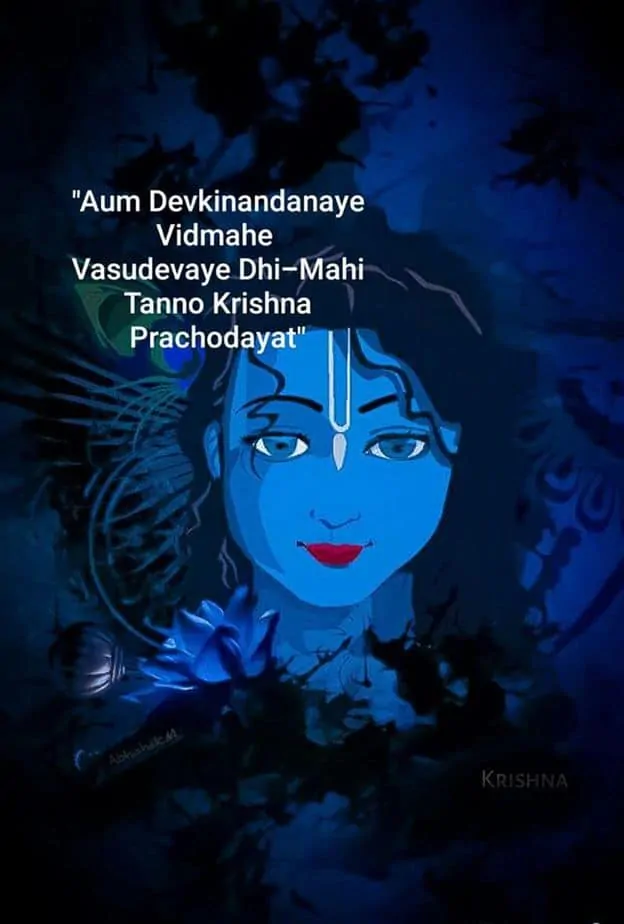
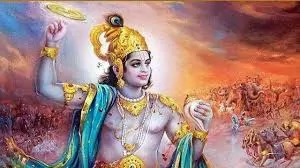
The most dramatic figure of the entire Mahabharata, however, was Krishna who was the supreme personality of Godhead himself, descended to earth in human form to reestablish his devotees as care takers of the earth, and who practiced Dharma.
Krishna was the cousin of both parties, but he was a friend and advisor to the Pandavas, became the brother-in-law of Arjuna, and served as Arjuna’s mentor and charioteer in the Great War. Krishna is portrayed several times as eager to see the war occur, and in many ways the Pandavas were his human instruments for fulfilling that end.
Throughout their lives and the terrible Great War, there were examples of the ethical gaps between men which were never resolved. In the aftermath of the war, Yudhishthira alone was terribly troubled, but his sense of the war’s wrongfulness persisted to the end of the
text. This was in spite of the fact that everyone else, from his wife to Krishna, told him the war was right; even the dying patriarch, Bhishma, lectured him at length on all aspects of the Good Law (the Duties and Responsibilities of Kings).
In the years that followed the Great War, the only survivors on the part of the Kauravas, Duryodhana’s parents, King Dhritarashtra and his queen, Gandhari lived a life of asceticism in a forest retreat and died with yogic calm in a forest fire. Kunti, the mother of the Pandavas was with them too. Krishna departed from this earth thirty-six years after the Great War. When they learned of this, the Pandavas believed it was time for them to leave this world too and they embarked upon the ‘Great Journey,’ which involved walking north toward the polar mountain that is toward the heavenly worlds, until one’s body dropped dead. One by one, beginning with Draupadi, the Pandavas died along the way until Yudhishthira was left alone with a dog that had accompanied him from the start.
Yudhishthira made it to the gates of heaven and there refused the order to drive the dog back, at which point the dog was revealed to be an incarnate form of the God Dharma (the God who was Yudhishthira’s actual, physical father), who was there to test Yudhishthira’s virtue. Once in heaven Yudhishthira faced one final test of his virtue: He saw only the Dhartarashtra Clan in heaven, and he was told that his brothers were in hell.
He insisted on joining his brothers in hell, if that were the case! It was then revealed that they were really in heaven, that this illusion had been one final test for him.
BHAGAVAD GITA
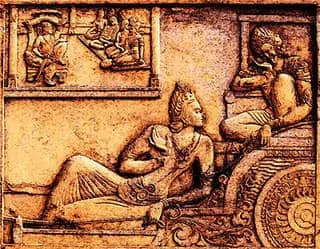
As Arjuna is reluctant to fight, KRISHNA reveals:
” TRUTH,PURPORT OF LIFE”
The Bhagavad Gita
The Bhagavad Gita forms a section of the sixth book of the Mahabharata, an important Sanskrit epic in the Hindu tradition that recounts a lengthy struggle and brief war between two sides of the Bharata family—the Pandavas and the Kauravas—over their kingdom of Hastinapura. The Gita recounts a dialogue in the moments leading up to the war between the Pandava warrior Arjuna and his charioteer and trusted advisor, Krishna, who turns out to be a worldly incarnation of Vishnu, a god who serves as the Supreme Being in many forms of Hinduism. However, Arjuna and Krishna’s dialogue is actually recounted through a frame story: Sanjaya, an advisor to Dhritarashtra (the Kauravas’ father and the blind king of Hastinapura), reports this dialogue to the king after the Pandavas have already won the war.
In the first of the Gita’s eighteen sections or discourses, Sanjaya describes the extensive Pandava and Kaurava armies that meet to fight on the “field of dharma.” While the Kauravas have more men, the Pandavas seem to have the gods’ favor, as they respond to the Kauravas’ impressive conch horns with divine ones that shake the earth and sky. As Krishna drives Arjuna’s chariot into the middle of the battlefield, Arjuna realizes that he cannot bear to kill his cousins, which he believes would destroy the dharma, or moral standing, of his entire family and poison any pleasure he might derive from victory. He lowers his weapon and begins to weep.
Krishna reprimands Arjuna at the beginning of the second discourse, calling him a coward and suggesting that he is blind to the fundamental truth that people’s souls do not die with their bodies. Rather, the eternal soul is reincarnated in another body, so Arjuna should not grieve for his family members but instead follow his dharma as a kshatriya (warrior) by fighting. If he wins the war, Arjuna will rule the earth; if he loses, he will ascend to heaven; but if he refuses to fight, he will disgrace himself. In addition to grasping these truths intellectually, Krishna says that people can learn to stop clinging to the fruits of action, turn away from the false realm of the senses, and free themselves from negative emotions by practicing yoga. Each of these routes promises to help people dissolve their sense of self, transcend the material world, and blissfully reunite with the absolute being called Brahman.
In the third discourse, Arjuna asks why Krishna wants him to act if he believes that enlightenment comes from restraining one’s impulse to action. Krishna argues that everyone must act by virtue of being in the world, but that these actions are the workings of material elements called gunas rather than the will of the individual soul. The only pure form of action is sacrifice to the gods, which leads the gods to sustain human life on earth.

Krishna begins to reveal his true nature to Arjuna in the fourth discourse: he is eternal, intervenes in the universe whenever necessary to maintain dharma, and dedicates himself to those who perform sacrifices for him—especially those who sacrifice their knowledge by surrendering it to him.
In the fifth discourse, Arjuna notes that the renunciation of action (samnyasa) and yoga (which is a form of action) seem to be opposites, yet Krishna considers both as viable means to enlightenment. Krishna replies that yoga is a means to renunciation, because it allows people to overcome their ignorant motivations for action. In the sixth discourse, Krishna explains that this meditative yogic discipline allows people to understand their unity in Brahman with all other beings, which can lead them to transcend the cycle of rebirth (samsara) or, at the very least, reincarnate into purer bodies.
In the seventh discourse, Krishna explains that he truly encompasses everything, from all the material things that comprise the earth to his higher being, the force that creates and dissolves the world. His true being is formless, timeless, and beyond all dualities; he loves the wise few who understand these fundamentals. In discourse eight, Krishna suggests that people can transcend rebirth and join him directly if they learn to fix their minds on him constantly, and particularly at the moment of death. The ninth discourse expands on Krishna’s all-pervasive nature, absolute power over the world, and providence over those who worship him.
In the tenth and eleventh discourses, Krishna turns from an intellectual explanation of his power to concrete demonstrations of it. The god professes his love for Arjuna, who in return acknowledges him as the highest being of all and asks about his divine forms. Krishna begins to enumerate these forms, declaring himself the greatest of each kind of thing, person, and force that exists in the world as well as the characteristics in virtue of which such kinds exist at all—he is wisdom among the wise and authority among rulers, silence among the hidden and “the ancient seed of all beings.” But Krishna’s numerous descriptions barely scratch the surface of his infinite power; he shows himself to Krishna in the eleventh discourse, taking on a form with innumerable eyes, mouths, and limbs that seems to contain everything, including infinite light, all the Bharata warriors, the entire world, and all the other gods. Arjuna worships Krishna with shock and fear, apologizing for his ignorance and asking the “Incomparable One” for mercy and patience. Krishna notes that nobody—not even the gods—has seen this form before.
After securing Arjuna’s eternal fealty, Krishna goes on to explain that it is easier for devotees to worship his embodied forms than to grasp his true, formless self and offers practical advice for Hindus of different dispositions in his twelfth discourse. In the thirteenth, he distinguishes the body from the eternal, immaterial soul that bears various bodies on its way to enlightenment. The gunas that comprise the body and bind the soul to it—sattva (purity), rajas (passion), and tamas (ignorance)—are the subject of Krishna’s fourteenth discourse. By relinquishing rajas and tamas for the sake of sattva, people can rise up toward disembodiment through the cycle of reincarnation (samsara). Krishna begins the following discourse with the image of a holy ashvattha tree whose roots can be severed by “the strong axe / of non-clinging”—again, by relinquishing one’s attachments to action, one can overcome even the most firmly rooted connections to the world and integrate oneself into the indestructible, eternal spirit that lies behind apparent reality.
In his sixteenth discourse, Krishna distinguishes characteristics of the divine person nearing enlightenment—like truthfulness, self-control, discipline, compassion, and courage—from those of greedy, angry, demonic people who turn away from Vedic laws and elevate desire above God. Arjuna asks Krishna to elaborate on Vedic rituals in the seventeenth discourse, and the Lord tells him that sattvic people perform sacrifices according to Vedic law in order to honor the gods and without any simultaneous material goals. He also outlines three forms of food, bodily discipline, and gift-giving in accordance with the three gunas.
In the final discourse, Krishna emphasizes the distinction between renouncing all action—which usually happens because of desire—and acting for action’s sake, without an attachment to consequences or desires. People who can relinquish this interest in the fruits of action are called tyagis, and in their actions, they perceive all beings as eternal dimensions of the same unified whole, following their dharma fearlessly and steadfastly. He notes that dharma often follows one’s position in the caste system—which in turn reflects people’s inner nature—and emphasizes that one must fulfill this prescribed role, even if imperfectly, in order to purify oneself.
Accordingly, Krishna implores Arjuna once again to fight the war but reminds him that the decision is his alone. Finally, Krishna requests Arjuna’s absolute devotion and charges him with spreading the Gita’s message to those sufficiently disciplined and devoted to properly receive “this highest, hidden truth.” Arjuna resolutely agrees; in the Gita’s closing lines, the minister Sanjaya expresses his gratitude and enthusiasm at hearing Krishna’s words and declares that Arjuna is blessed to bring “splendor, / victory, well-being, / and wise conduct”

- Nama Japam(repetition) or Nama Sankeertanam is the japa or Sankirtana of nama (name) of the Almighty. The devotee chooses Ishta-deva or Ishta devata (Sanskrit iṣṭa-deva(tā), literally “cherished divinity” from iṣṭa “desired, liked, cherished” and devatā “godhead, divinity,” or deva “deity”) and picks up a name of the Ishta deva to repeatedly chant the name vocally or in the mind any time, anywhere. Devotees can form a group and do sankeertanam or singing together of name of the Almighty.
- Bhishma considered chanting of the Vishnu sahasranama the best and easiest of all dharmas, or the means to attain relief from all bondage.
- Adi Sankaracharya, the Advaita enlightened master, in verse 27 of his hymn, Bhaja Govindam, said that the Gita and Vishnu sahasranama should be chanted and the form of the Lord of Lakshmi-Narayana should always be meditated on. He also said that the Sahasranama bestowed all noble virtues on those who chanted it.
- Sri Krishna has mentioned in Srimad Bhagavad Gita, that He resides in the hearts of those who chant and sing His namas.
GOVINDA NAMA BHAJAN
CHANT- HARE KRISHNA HARE KRISHNA KRISHNA
।। हरिः ॐ ।।
Watch the animation Movie with sub titles..

